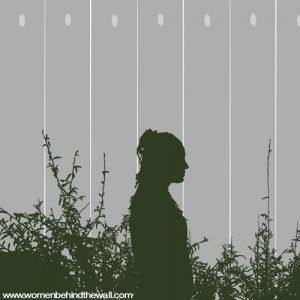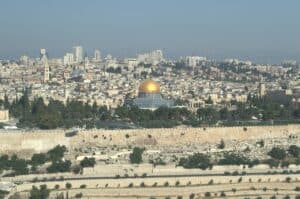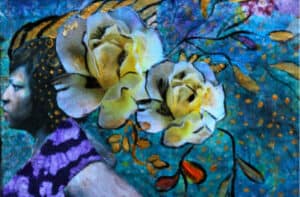 Podcast Episode #8: Generational Separation
Podcast Episode #8: Generational Separation
The Women Behind the Wall podcast highlights female voices from the Holy Land, and is hosted and produced solely by women who live and work in Jerusalem. The podcast seeks to amplify minority voices and perspectives, especially women’s experiences in the private sphere as it is affected by the public sphere. We hope you’ll join us here on Thursdays as we highlight each episode.
Listen to Generational Separation here
Get an inside look into the life of a religious convert, and the conversations that happen behind closed doors among family members after this type of cultural taboo.
Born and raised in a Muslim family in Galilee, Hanan was 23 years old when she converted to Christianity. In this episode of the Women behind the Wall podcast, listeners get an inside look into the life of a religious convert, and the conversations that happen behind closed doors among family members after this type of cultural taboo becomes known. Religion is more than a belief here, it dictates one’s social interactions, and Hanan embraces that her family name and background is Islamic. “It is not something that I can run from, or delete from my life, and I don’t want to.”
Given this, Hanan explains how she finds it uncomfortable to define herself culturally and religiously. “When people ask me to define myself, usually it’s not easy because none of the answers will fulfill the expectations of others… they want me to define myself as a Christian, and yes, biblically I am a Christian but culturally I am not, and I don’t belong to the Christian community.”
She further explains how religion is something that is culturally passed on from your family, that you are born into it; whether or not you practice in the religious aspects of that faith or not, it is your family, your community. “Religion and socialization – you can’t have it separated; they are connected.” And speaking about her own conversion, Hanan knew that it would hurt her family.
Hanan first confided in her cousin, who tried to convince her that the pressure would affect the family and would leave shame for generations. While Hanan fully knew this reality, she was not willing to give up her faith in Christ. When her mother found out, Hanan first denied the truth, but a week later, she decided to be honest. “My mother accepted my faith, but she asked me to keep it low profile. And I said, okay, I will, I am.”
But Hanan knew once her father found out, she would have a problem. For six years she found support within the church and felt free to practice her faith before her father discovered the truth. When she told him, he had a heart attack. “I see that my father is dying in front of me, at the same time my brothers and mother are blaming for that.”
Thankfully, her father recovered, but demanded that she not practice her faith at all in the family house where she still lived. After four months, while her father was away, Hanan went to church. When she was leaving the building, her father found her and told her she must leave their home. Hanan found herself confronted with another cultural taboo, since women at that time, and even today, did not leave their family homes unless they were going to study or getting married. Nonetheless, she moved to Jerusalem.
She maintained a relationship with her mother and brothers but tells a story about her first visit back to the house, when her father spit on her and left the room. Over time, he allowed her to come back for visits but would not eat at the same table as her. “It took eight years until he pronounced my name again.” Hanan says that today their relationship is back to where it was, but it took many, many years of rebuilding.
When Hanan moved to Jerusalem, a city that is far more religious than where she is from, and tensions from the conflict are experienced more, she explains that she was afraid. “People are religious, everybody! Christians, Muslims, Jewish, and there are people who don’t speak to each other, and each group has a lot of things against the others. And of course, there are the bombings – really, I was afraid of everybody… I had a lot of fear. Also, there are the checkpoints which was new experience to me.”
Focusing more on how the conflict has impacted the generations of her family, Hanan, like all Palestinians, has experienced another type of family separation. “For me as a Palestinian woman, I grew up in Galilee but in a place that is not my family place. I had my village; it was only 25 minutes away from the city that I was living in. And passing from there, going to do things or visiting, and there you’ll find other people who are living there who are from Europe and from different countries, but I am not allowed to live there. My land, and my home, my family home, my grandfather’s home, is somewhere else.” This is a common story for many Palestinian citizens of Israel who were displaced during the Nakba, and until today are not allowed by the Israeli government to return to their home villages.
I am not allowed to live there. My land, and my home, my family home, my grandfather’s home, is somewhere else.
“The occupation means that for us when we grow up on stories like, when my grandfather had to run with his nine children, one of them she was one month old. Of course, she was a baby, she was crying, and my grandfather had to decide if he’s going to kill his daughter with his own hands, or not because she was crying and that means it put all the family and all the other families who were running in danger because they were hiding. So, growing up on stories like this, that my grandfather had to make this decision. In the end, he didn’t do it – but what if he did?” Trauma is evident in her family’s story of fleeing and displacement, like so many Palestinians in the region.
Just as Hanan has experienced separation from her own family, her family has been separated from their land for generations. This episode goes into depth about observing the different treatment people experience depending on who they are or where they are from, and especially how intense Jerusalem can be among so much division. It offers a glimpse into the lived experience of a person straddling those divisions.
God, we thank you for Hanan and her family. We pray for all of your children in the Holy Land and around the world that experience separation from loved ones and home, in all forms. We ask for you to equip your people, the Church, with the tools and endurance to build bridges instead of walls, to reunite, instead of divide, and to embrace each other as one family. Amen.
CSA is grateful to our friends at Churches for Middle East Peace for reprint permissions.


